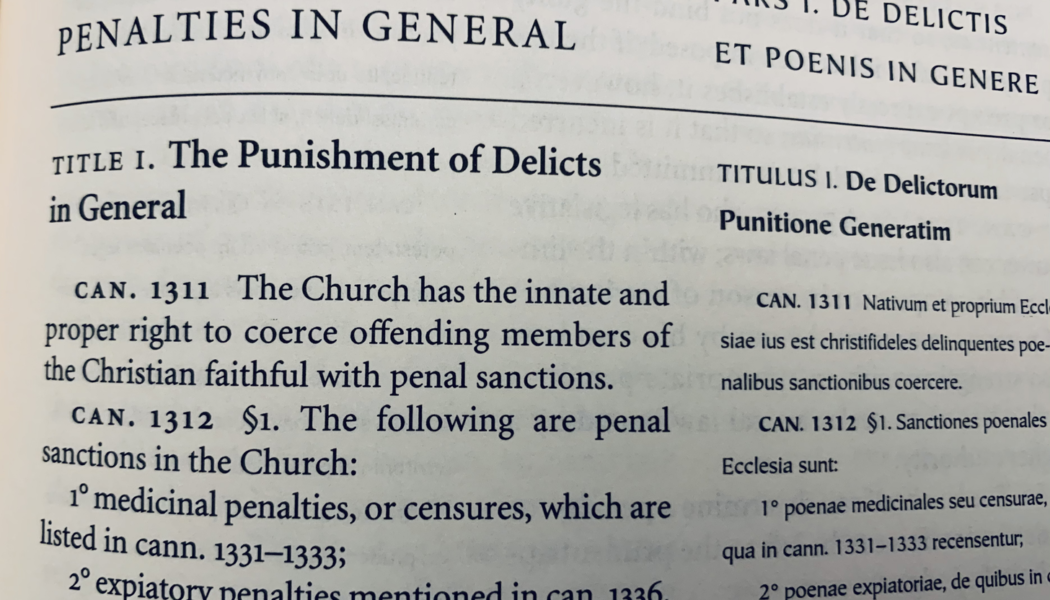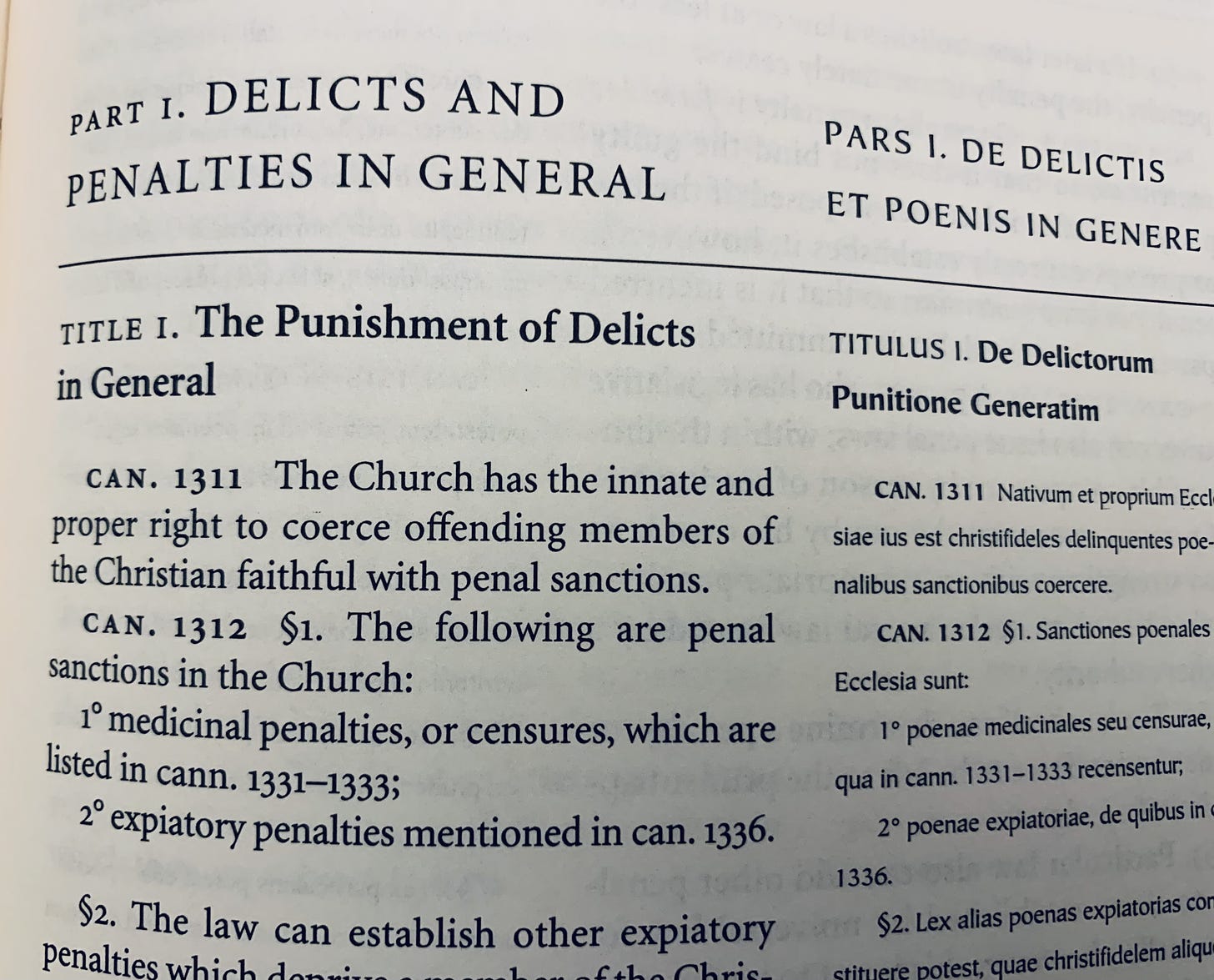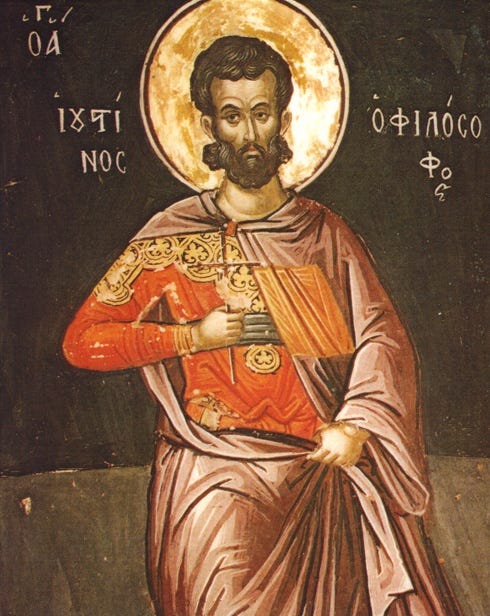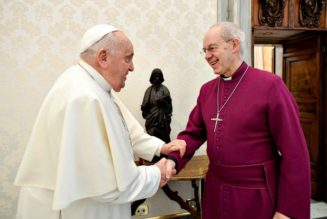Hey everybody,
Welcome to the Tuesday Pillar Post.
For canon lawyers, today is a long-awaited day. Pope Francis has promulgated the new Book VI of the Code of Canon Law, which contains the Church’s universal penal law. This is a big deal in the life of the Church.
I have been hearing since I was a canon law student in 2005 or 2006 that a new Book VI was forthcoming, and would soon be released. While 15 years is like the blink of an eye for a Church which thinks in centuries, it is nonetheless hard to believe the day is really here.
Of course, the Church’s new penal law won’t actually take effect until December 8, which will give bishops, canonists, and the dicasteries of the Holy See time to prepare for actually taking up and operating under a new set of laws.
After some links to the news, I’ll break down everything you need to know about the new Book VI.
But first:
The News
‘The pope issues new rules, but everyone has their own plan’
Five months after Pope Francis ordered that the Vatican Secretariat of State hand over control of some funds to the Secretariat for the Economy, the handover hasn’t happened, according to senior Vatican officials.
“Every effort is being made,” a senior Vatican official close to the Secretariat for the Economy told us. “And every effort is met with evasion, obstruction, or just silence.”
Stalling and simple non-compliance seem aimed at thwarting the pope’s financial reform measures, Vatican officials said, even amid an ongoing criminal investigation into financial management at the Secretariat of State.
‘Hallow’ be thy app
If you’re Catholic, and you spend any time scrolling through Facebook/Instagram/Twitter, you’ve probably seen ads for the Hallow app — purportedly the Catholic answer to wildly popular meditation apps like Headspace or Calm.
I’ve been seeing Hallow ads for a while, but I wasn’t curious about the app until I saw in April that a large Silicon Valley venture capital firm, General Catalyst, had invested $12 million into the company that produces the Hallow app. The firm said it believes the app represents “the future of faith for the emergent digital world.”
To see what the hype is about, we asked freelance writer Mary Farrow to put Hallow on her phone and use it to guide her prayer life for two weeks. Mary also talked to Hallow’s CEO, to the General Catalyst investor who connected with the company, to a few Hallow users, and to some spiritual directors.
May perpetual light shine upon them
Yesterday was Memorial Day, the annually weird tradition in which a national day of mourning pulls double duty, to serve as the official three-day-weekend kickoff to summer. It’s a strange juxtaposition.
Hopefully, between spikeball matches, plates of smoked brisket, and cans of White Claw (the official summer drink of The Pillar), you remembered to pray for the souls of America’s war dead.
But if you didn’t, you can pray today for the souls of American men and women killed in action as members of our armed forces. Among them are at least 30 priest chaplains who have died in America’s wars. You might also remember Catholic religious sisters who have died while serving as nurses in military hospitals during American wars, especially during the Civil War.
For Memorial Day, we told some of their extraordinary stories. Like this one:
Fr. Aloysius Schmitt was a farm boy, a North American College graduate, a priest of Dubuque, Iowa, and a war hero.
He became a Navy chaplain in 1939, and by December 1941 was serving on board the battleship USS Oklahoma. The ship’s home port was Pearl Harbor, Hawaii. That’s the port where she was moored on December 7, 1941, when Japanese planes launched a sneak attack, firing torpedoes on the naval ships at Pearl Harbor.
Fr. Schmitt was below deck when torpedoes hit the Oklahoma, and the ship began to capsize. The only means of escape from that part of the ship was a small porthole. The priest helped a number of sailors escape, but when it was his turn to swim through the porthole, he instead turned back into the ship, looking for more sailors who might need help.
Read more about Fr. Schmitt’s heroic story, and about others like him, here.
Book VI 2.0: ‘The restoration of justice’ and the Church’s new canon law
The history of canon law is as old as the Church herself, but universal canon law has only existed in codified singular texts since 1917, and since that time, two codes have been promulgated: the code of 1917, and then replacing it, the code of 1983.
Never before today has an entire book of the Church’s codified universal law been replaced in one fell swoop, so the promulgation of the new Book VI is a big deal.
And it’s especially a big deal right now, as it comes on the heels of the Theodore McCarrick scandal, with all that entailed. In a number of concrete ways, it is obvious that the newly revised text has been dramatically influenced by the events of the past years.
Ok, so, here’s what you really need know:
-
Pope Francis introduction to the new text, the apostolic constitution Pascite Gregem Dei, took a very hard swipe at the pervasive trend of antinomianism, or indifference to the application of penal law in the Church, that has cropped up in the Church’s life most especially in the past 5 decades. The pope wrote:
“Many have been the damages caused in the past by the lack of understanding of the intimate relationship that exists in the Church between the exercise of charity and the performance of punitive discipline, whenever the circumstances and justice require it. This way of thinking –experience teaches it– carries the risk of temporizing with behaviors contrary to discipline, for which the remedy cannot come only from exhortations or suggestions. This attitude often carries with it the risk that, with the passage of time, such ways of life crystallize, making correction more difficult and in many cases aggravating the scandal and confusion among the faithful.”
If you’ve spent any time around The Pillar, you know that we’ve attributed much of the sexual and financial scandals of recent years to a basic failure on the part of many Church officials to understand the application of penal law as an act of justice, good governance, and charity. That failure has led, we’ve argued, to an environment of increasingly lax standards, on the one hand, and an increasingly draconian approach to punishing the few canonical crimes the Church actually punishes with regularity. So the pope’s exhortation to more concretely incorporate penal law as an ordinary and charitable expression of the Church’s life is not a throwaway comment, but a strong and serious exhortation to diocesan bishops and religious superiors.
-
In several places, the new text requires bishops and religious superiors to initiate penal processes or impose punishments when canon law has been violated, even for relatively minor offenses, while the old text in those places encouraged them to, but left the matter to their judgment. This emphasizes the new text’s general expectation that bishops and superiors will incorporate penal law into their ordinary governance of the Church’s life, as part of a general tightening of Church discipline.
-
The new text also emphasizes that bishops and episcopal conferences should develop a more graduated system of penalties for canonical crimes than is currently in place, which would include things like the payment of monetary fines for infractions. The text clarifies that certain measures previously called into question – like a prohibition against wearing clerical dress – are canonically legal. It also clarifies that bishops can impose penalties and prohibitions tailored to offenses at differing levels of gravity, which can escalate if offenses against Church discipline escalate.
-
The new text asserts directly the presumption of innocence in canon law. It also changes the way that canonical statutes of limitation — called prescription — work, in order to ensure that priests accused of misconduct can’t sit in limbo forever.
If a penal process begins, but then sits for a long time with no real movement — something which is known to happen in canon law — the clock can run out on imposing a penalty on the priest.
-
The text establishes that if a person abuses his office or power in order to commit a canonical crime, the person should be punished more severely.
-
The text incorporates several canonical crimes related to sex, grooming, and child pornography that had already been promulgated in canon law, but were contained in decrees and documents outside of the universal code. These include committing sexual abuse against a person “who has imperfect use of reason,” and “grooming or inducing” a minor “to expose himself or herself pornographically.”
-
Canonists and Vatican officials will have questions about how broadly the notion of “vulnerable person” will apply in penal law related to sexual offenses. The term is not used in the new text, but is alluded to, without resolving an ongoing technical dispute among Vatican offices about how broadly that notion applies to parishioners and other Catholics who interact with clerics. The dispute could impact considerably how many cases involving priests falling into sexual sin with adults are regarded as potentially criminal situations of abuse.
-
A rather dramatic change is that religious brothers and sisters, and even lay Catholics, can also be punished in canon law for various canonical offenses related to sexual abuse. For most of the last two decades, ambiguity about that possibility has been raised as a major gap, or lacuna, in the Church’s existing penal law.
-
The proof of the pudding, as they say, is in the eating.
The text includes some major clarifications, changes, and developments in canon law, and is accompanied by a strong exhortation from Pope Francis to actually take seriously the notion that punishment can be an important part of good leadership. But the onus is on bishops to actually take that exhortation seriously, and use the tools given to them to ensure better discipline in their local dioceses. If that doesn’t happen, legal changes at the universal level will only exist on paper.
Another canonical thing: Boris Johnson gets married, and people get angry
Even before the promulgation of the new Book VI, canon law was in the news this week because the twice-divorced Prime Minister Boris Johnson of the United Kingdom was married on Saturday at London’s Westminster Cathedral. The wedding prompted a tremendous backlash in the British press, and then on social media, from people who said the Catholic Church had been hypocritical to allow a powerful divorcee to be married in a cathedral of national importance.
What followed was bad media coverage from the secular press, near equally bad and erroneous explanations of canon law and sacramental theology from some Catholic apologists, radio silence from most British Catholic officials, and then some political grandstanding from activist clerics inside and outside the Catholic Church.
So here is a very direct and basic explainer of what the Church teaches about marriage:
-
Marriage is a lifelong partnership between one man and one woman that exists for the good of spouses and for the procreation and education of children. Marriage is an institution of natural law established by the Creator, into which people both baptized and unbaptized can enter validly.
-
If two unbaptized people contract marriage freely, they have a valid marriage. If an unbaptized person and a baptized person contract marriage freely, they have a valid marriage.
-
If the two parties in a marriage are both baptized, the marriage is a sacrament. Marriage is unique among the sacraments, because it is a natural institution that is raised into the sacramental order when it exists between the baptized.
-
Unbaptized people and baptized non-Catholics can generally contract marriage validly as long as they follow the requisite civil laws of the place where they are.
Catholics can only contract a valid marriage (with certain limited exceptions) when they do so by observing the “canonical form” prescribed by the Church, which is to say, generally, that Catholics can only contract marriage when the exchange of consent is witnessed by a properly delegated minister of the Church, and when the marriage takes place in a sacred space. This norm has been a requirement for Catholics since the 16th century.
-
It is impossible for two Catholics to have a valid but non-sacramental marriage, or to differentiate the sacramentality and the validity of marriages between the baptized. Marriage is one thing, and when it exists between the baptized, it has a sacramental character. But for Catholics, it only exists if the form prescribed by the Church has been followed.
Now, as regards Boris Johnson, Mr Johnson is a Catholic. His new wife is a Catholic. He previously attempted marriage, twice, but neither attempt observed canonical form, and thus Mr. Johnson did not contract marriage validly in either case. He was therefore free to marry. So was his new wife. In light of that, they married one another on Saturday.
Such things happen in Catholic Churches around the world every day of the week. Insofar as I can tell, Mr. Johnson received no special treatment with regard to his being “allowed” to attempt marriage on Saturday. Instead, the Church regards the right to attempt marriage to be an ordinary human right, which it seem Mr. Johnson and his wife exercised on Saturday.
St. Justin Martyr, pray for us
Today is the feast of St. Justin Martyr, a second century Christian martyr, whose “Apology” is an enduring testimony to the faith, as it was understood and explained by a believer who lived very close to the time of Jesus Christ himself.
Justin was martyred in Rome in the year 165. Before he was beheaded, he faced a trial, or an inquiry at least, before the Roman prefect Junius Rusticus. A record of the trial is fascinating reading.
Shortly before he died, Justin was asked what he believed. Here’s what he told the prefect:
“Worship the God of the Christians. We hold him to be from the beginning the one creator and maker of the whole creation, of things seen and things unseen. We worship also the Lord Jesus Christ, the Son of God. He was foretold by the prophets as the future herald of salvation for the human race and the teacher of distinguished disciples. For myself, since I am a human being, I consider that what I say is insignificant in comparison with his infinite godhead. I acknowledge the existence of a prophetic power, for the one I have just spoken of as the Son of God was the subject of prophecy. I know that the prophets were inspired from above when they spoke of his coming among men.”
Among the most compelling aspects of St. Justin’s famous “Apology” is his account of Holy Mass:
There is then brought to the president of the brethren bread and a cup of wine mixed with water; and he taking them, gives praise and glory to the Father of the universe, through the name of the Son and of the Holy Ghost, and offers thanks at considerable length for our being counted worthy to receive these things at His hands. And when he has concluded the prayers and thanksgivings, all the people present express their assent by saying Amen…And when the president has given thanks, and all the people have expressed their assent, those who are called by us deacons give to each of those present to partake of the bread and wine mixed with water over which the thanksgiving was pronounced, and to those who are absent they carry away a portion.
And this food is called among us Eucharistia [the Eucharist], of which no one is allowed to partake but the man who believes that the things which we teach are true, and who has been washed with the washing that is for the remission of sins, and unto regeneration, and who is so living as Christ has enjoined. For not as common bread and common drink do we receive these; but in like manner as Jesus Christ our Saviour, having been made flesh by the Word of God, had both flesh and blood for our salvation, so likewise have we been taught that the food which is blessed by the prayer of His word, and from which our blood and flesh by transmutation are nourished, is the flesh and blood of that Jesus who was made flesh.
You can read the entire text here.
As always, there’s plenty more we have to report at The Pillar, so if you want more news, and more explanation and assessment on the new norms of canon law, stay tuned, and consider subscribing to our work:
If you found this newsletter helpful, please pass it on:
Please pray for us, and be assured of our ongoing and daily prayers for you. And thank you for supporting our work.
Yours in Christ,
JD Flynn
Editor-in-chief
The Pillar
Join Our Telegram Group : Salvation & Prosperity











